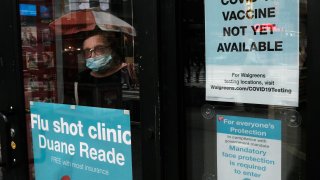
Investors have gotten too enthusiastic over coronavirus vaccines and instead should be selling the news, Bank of America's top strategist said in light of the firm's most recent fund manager survey.
Optimism over both corporate profits and economic growth are at 20-year highs, the closely watched market gauge showed for November.
Cash levels in portfolios have plunged below where they were prior to the Covid-19 pandemic and are just shy of what BofA considers a sell signal. Allocation to stocks is a net 46% overweight, the highest since January 2018 and also near "extreme bullish" levels that also would be considered a contrarian indicator to cut exposure.
Managers also have moved into small caps and emerging market stocks.
Putting it all together, it means the "reopening rotation can continue in Q4 but we say 'sell the vaccine' in coming weeks/months as we think we're close to 'full bull,'" Michael Hartnett, Bank of America's chief investment strategist, said in a summary of the survey.
Stocks have taken another leg up since Pfizer announced last week that its vaccine had achieved a 90% success rate in trials. Moderna followed that this week by saying it had a vaccine with a more than 94% efficacy level.
The S&P 500 is on a tear in November, rising about 11% in the month so far following the vaccine news and the presidential election.
Money Report
A net 91% of fund managers now think the economy will be stronger over the next year, the highest level since March 2002, the survey showed. That comes as 66% say the global economy is in an early-cycle expansion, the highest since March 2010, with just 19% seeing a recession.
On the profits front, a net 84% see improvement over the next year, also the highest since March 2002.
Managers have responded by shifting money from cash, bonds and consumer staple stocks into emerging markets, small caps, value and banks.
That comes even though a record 73% expect a steeper yield curve, which is an even greater share than around the landmark Lehman Brothers bankruptcy that brought the worst of the 2008 financial crisis, as well as the 2013 Fed taper tantrum and the 2016 presidential election.
Investors still see the pandemic as the top tail risk, followed by a bubble in tech stocks, civil unrest and an unspecified credit event. Tech remains by far the most-crowded trade.






